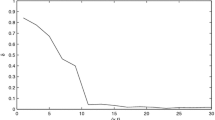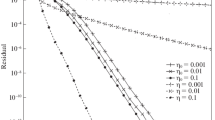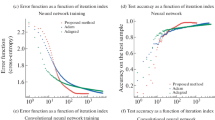Abstract
This paper proposes a stochastic gradient algorithm and two modified stochastic gradient algorithms for a nonlinear two-variable difference system. The output and the input of a two-variable parameter system depend on time and on spatial coordinates. A stochastic gradient algorithm is introduced to estimate the unknown parameters. In order to increase the convergence rate but not to increase the computational effort, two modified stochastic gradient algorithms are also proposed. The simulation results indicate that the proposed methods are effective.
Similar content being viewed by others
References
B. S. Kim and S. J. Yoo, “Approximation-based adaptive tracking control of nonlinear pure-feedback systems with time-varying output constraints,” International Journal of Control, Automation, and Systems, vol.13, no. 2, pp. 257–265, April 2015. [click]
B. Zhang and Z. Z. Mao, “Consistent parameter estimation and convergence properties analysis of Hammerstein output-error models,” International Journal of Control, Automation, and Systems, vol.13, no. 2, pp. 302–310, April 2015. [click]
H. Chen, “Robust stabilization for a class of dynamic feedback uncertain nonholonomic mobile robots with input saturation,” International Journal of Control, Automation, and Systems, vol. 12, no. 6, pp. 1216–1224, December 2014. [click]
D. Z. Xu, B. Jiang, and P. Shi, “A novel model free adaptive control design for multivariable industrial processes,” IEEE Transactions on Industrial Electronics, vol. 61, no. 11, pp. 6391–6398, November 2014.
D. Z. Xu, B. Jiang, and P. Shi, “Adaptive observer based data-driven control for nonlinear discrete-time processes,” IEEE Transactions on Automation Science and Engineering, vol. 11, no. 4, pp. 1037–1045, October 2014.
Y. W. Mao and F. Ding, “Multi-innovation stochastic gradient identification for Hammerstein controlled autoregressive autoregressive systems based on the filtering technique,” Nonlinear Dynamics, vol. 79, no. 3, pp. 1745–1755, February 2015. [click]
H. B. Chen and F. Ding, “Hierarchical least squares identification for Hammerstein nonlinear controlled autoregressive systems,” Circuits, Systems and Signal Processing, vol. 34, no. 1, pp. 61–75, January 2015.
F. Ding, K. P. Deng, and X. M. Liu, “Decomposition based Newton iterative identification method for a Hammerstein nonlinear FIR system with ARMA noise,” Circuits, Systems and Signal Processing, vol. 33, no. 9, pp. 2881–2893, September 2014.
E. Malekshahi and S. M. Mohammadi, “The model order reduction using LS, RLS and MV estimation methods,” International Journal of Control, Automation, and Systems, vol. 12, no. 3, pp. 572–581, June 2014. [click]
B. Yu, H. Fang, Y. Lin, and Y. Shi, “Identification of Hammerstein output-error systems with two-segment nonlinearities: algorithm and applications,” Journal of Control and Intelligent Systems, vol. 38, no. 4, pp. 194–201, 2010.
A. Mahmoudi and M. Karimi, “Estimation of the parameters of multi-channel autoregressive signals from noisy observations,” Signal Processing, vol. 88, no. 11, pp. 2777–2783, November 2008. [click]
S. K. Zhao, Z. H. Man, S. Y. Khoo, and H. R. Wu, “Variable step-size LMS algorithm with a quotient form,” Signal Processing, vol. 89, no. 1, pp. 67–76, January 2009. [click]
M. S. Ahmad, O. Kukrer, and A. Hocanin, “Recursive inverse adaptive filtering algorithm,” Digital Signal Processing, vol. 21, no. 4, pp. 491–496, July 2011. [click]
J. Vörös, “Modeling and identification of systems with backlash,” Automatica, vol. 46, no. 2, pp. 369–374, February 2010.
G. C. Goodwin and K. S. Sin, Adaptive Filtering Prediction and Control, Prentice-Hall, Englewood Cliffs, NJ, 1984.
F. Ding, H. Z. Yang, and F. Liu, “Performance analysis of stochastic gradient algorithms under weak conditions,” Science in China Series F–Information Sciences, vol. 51, no. 9, pp. 1269–1280, September 2008. [click]
F. Ding, P. X. Liu, and H. Z. Yang, “Parameter identification and intersample output estimation for dual-rate systems,” IEEE Transactions on Systems, Man, and Cybernetics, Part A: Systems and Humans, vol. 38, no. 4, pp. 966–975, 2008.
J. Chen and Y. X. Ni, “Parameter identification methods for an additive nonlinear system,” Circuits, Systems and Signal Processing, vol. 33, no. 10, pp. 3053–3064, October 2014. [click]
J. Chen and F. Ding, “Modified stochastic gradient algorithms with fast convergence rates,” Journal of Vibration and Control, vol. 17, no. 9, pp. 1281–1286, July 2011.
C. K. Qi, H. X. Li, S. Y. Li, X. C. Zhao, and F. Gao, “A fuzzy-based spatio-temporal multi-modeling for nonlinear distributed parameter processes,” Applied Soft Computing, vol. 25, pp. 309–321, December 2014. [click]
H. X. Li and C. K. Qi, Spatio-temporal Modeling of Nonlinear Distributed Parameter Systems-A Time/space Separation based Approach, Springer, 2011.
H. X. Li and C. K. Qi, “Modeling of distributed parameter systems for applications-A synthesized review from timespace separation,” Journal of Process Control, vol. 20, no. 8, pp. 891–901, September 2010.
S. Banerjee, J. V. Cole, and K. F. Jensen, “Nonlinear model reduction strategies for rapid thermal processing systems,” IEEE Transactions on Semiconductor Manufacturing, vol. 11, no. 2, pp. 266–275, May 1998.
H. X. Li and S. P. Guan, “Hybrid intelligent control strategy-Supervising a DCS-controlled batch process,” IEEE Control Systems Magazine, vol. 21, no. 3, pp. 36–48, June 2001.
H. X. Li, J. Liu, C. P. Chen, and D. Hua, “A simple modelbased approach for fluid dispensing analysis and control,” IEEE/ASME Transactions on Mechatronics, vol. 12, no. 4, pp. 491–503, August 2007.
Y. P. Hong and H. X. Li, “Comparative study of fluid dispensing modeling,” IEEE Transactions on Electronics Packaging Manufacturing, vol. 26, no. 4, pp. 273–280, October 2003.
S. Y. Yu, Y. Cao, and X. Zhou, “Algorithm of parameter identification for temperature distributed parameter system of large-scale vertical quench furnace,” Journal of Central South University: Science and Technology, vol. 39, no. 6, pp. 1285–1290, December 2008.
P. D. Christofides, Nonlinear and Robust Control of Partial Differential Equation Systems: Methods and Applications to Transport-Reaction Processes, Birkhauser, Boston, 2001.
X. L. Li, L. C. Zhou, and R. F. Ding, “Auxiliary model based forgetting factor stochastic gradient algorithm for dual-rate nonlinear systems and its application to a nonlinear analog circuit,” Circuits, Systems and Signal Processing, vol. 33, no. 6, pp. 1957–1069, June 2014.
F. Ding, System Identification—New Theory and Methods, Science Press, Beijing, 2013.
Author information
Authors and Affiliations
Corresponding author
Additional information
Recommended by Associate Editor Xiaojie Su under the direction of Editor Duk-Sun Shim. This work was supported by the National Natural Science Foundation of China (No. 61403165), the Natural Science Foundation of Jiangsu Province (No. BK20131109), the Post Doctoral Foundation of Jiangsu Province (No. 1501015A), and the Project of Philosophy and Social Science Research in Colleges and Universities in Jiangsu Province (No. 2014SJD381).
Jing Chen received his B.Sc. degree from the School of Mathematical Science and M.Sc. degree from the School of Information Engineering from Yangzhou University (Yanghzou, China) in 2003 and 2006, respectively, and received his Ph.D. degree from the School of Internet of Things Engineering, Jiangnan University (Wuxi, China) in 2013. He is currently a Visiting Professor in the Department of Chemical and Materials Engineering, University of Alberta (Edmonton, Canada). His research interests include Processing Control and system identification.
Bin Jiang received his Ph.D. degree in Automatic Control from Northeastern University (Shenyang, China) in 1995. He had ever been postdoctoral fellow, research fellow, invited professor and visiting professor in Singapore, France, USA and Canada, respectively. Now he is a Chair Professor of Cheung Kong Scholar Program in Ministry of Education and Dean of College of Automation Engineering in Nanjing University of Aeronautics and Astronautics (Nanjing, China). He currently serves as Associate Editor or Editorial Board Member for a number of journals such as IEEE Trans. on Control Systems Technology; IEEE Trans. on Fuzzy Systems; Int. J. of Control, Automation and Systems; Nonlinear Analysis: Hybrid Systems, etc. He is a senior member of IEEE, Chair of Control Systems Chapter in IEEE Nanjing Section, a member of IFAC Technical Committee on Fault Detection, Supervision, and Safety of Technical Processes. His research interests include intelligent fault diagnosis and fault tolerant control and their applications.
Rights and permissions
About this article
Cite this article
Chen, J., Jiang, B. Modified stochastic gradient parameter estimation algorithms for a nonlinear two-variable difference system. Int. J. Control Autom. Syst. 14, 1493–1500 (2016). https://doi.org/10.1007/s12555-015-0185-x
Received:
Revised:
Accepted:
Published:
Issue Date:
DOI: https://doi.org/10.1007/s12555-015-0185-x




